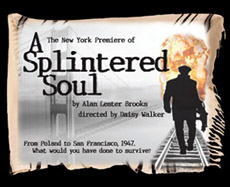A Splintered Soul, written by Dr. Alan Brooks ’63 and directed by Daisy Walker, will make its off-Broadway debut Oct. 21 in a limited engagement at Theater Three in New York City.
Brooks—who calls himself a “physician by profession and an author by preference”—has spent about a decade writing and developing A Splintered Soul. After retiring from full-time medicine and beginning the project in the late ’90s, Brooks estimates he’s rewritten the play over 100 times. “It took me eight or nine years just to learn how to write a play,” he says. “This version is the same story, but it’s presented in a tighter fashion.” Brooks currently spends much of his time in New York, allowing him to work closely with Walker in the final stages of the play’s production, but still calls Long Beach, Calif. and Homer, Alaska home.

In A Splintered Soul, a group of Jewish refugees arrives in San Francisco in 1947. A fellow Holocaust survivor and former freedom fighter, Rabbi Simon Kroeller, comes to their aid, but in his mission to protect them, he must confront the new moral circumstances they face in the New World. The play’s characters were largely inspired by Brooks’ childhood in the 1940s and ’50s, when many of his surviving relatives emigrated from Europe to America.
“The play presents the opportunity to talk about what’s right and wrong,” says Brooks, “… and how much circumstances can influence that.” When in Los Angeles, where the play was staged at the Odyssey Theater in 2007, Brooks found that many of the people who appreciated the play were immigrants themselves. He wasn’t surprised. “It’s a group of people who are trying to put their lives back together.”
Brooks was profoundly influenced by his own displacement, “the experience of going from one set of circumstances to another,” during the Vietnam War, when he served as a lieutenant commander in the U.S. Navy and then a volunteer physician tending to Vietnamese civilians. When he left this vicious environment—“people getting killed, people getting maimed, people starving,” as he recalls—for a relaxing break in Hong Kong, it was strange to meet Americans at expensive meals and nice hotels. Returning to the combat zone, however, was equally difficult: “They [went] back to their lives, and I went back … to all this chaos and insanity.” Brooks’ experience in Vietnam also inspired a special interest in the developing world that shaped his medical career. He has a degree in tropical medicine and hygiene and, despite being retired, still regularly travels to developing countries to volunteer and teach his specialty, radiology.
After a distinguished and public-spirited career in medicine, it was Brooks’ daughter Lisa who inspired him to pursue the creative arts. After college, when most of her friends went off to medical school or law school, Lisa decided to follow her dream of being a musician, and ended up touring for eight years and releasing half a dozen CDs. “She did it because she wanted to do it,” says Brooks, who has channeled the same passion towards the literary arts. “I’ve always wanted to be a writer,” he says. “Though I enjoyed being a physician … there is no creativity, in a sense. If you get creative as a doctor, you could end up in jail. In art, it’s just the opposite.”


